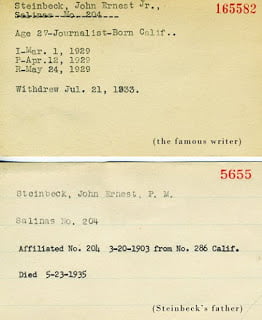I’m not usually a big flack for trumpeting “famous Freemasons.” We are often too quick to pat ourselves on the back over the membership of publicly known luminaries who turned out to have left the fraternity pretty quickly after joining for one reason or another. Even so, I’ve run across most of these over the years. But Brother Adam Kendall at the Henry Wilson Coil Library and Museum in San Francisco posted one I hadn’t ever heard of before: author John Steinbeck.
According to his Grand Lodge of California record, he was initiated in Salinas Lodge No. 204 on March 21st, 1929, passed on April 12th, and raised on May 24th that same year. His father, John E. Steinbeck, Sr. was a longtime member of the same lodge.
Unfortunately, for whatever reason, Steinbeck Jr. demitted just a little over four years after his raising.
Steinbeck wrote what is, in my opinion, one of the greatest commentaries on theology, philosophy, culture, and mankind in general in one, single, brief passage of his 1952 novel East of Eden. It has stuck with me for all of my life, ever since I read it almost four decades ago. In the passage, Adam Trask and his friend Samuel are listening to Adam’s longtime Chinese cook, Lee, who tells the men of his attempts to wrestle with just one single word in the Old Testament: the Hebrew word timshel.
Here is a link to the excerpt. I encourage you to read it, even if you never read the whole novel.
Shortly after I became a Mason, I asked to read the entire passage aloud one night in lodge, because I believed – and still do – that in many ways it encompasses the very essence of what we should pursue and discuss and answer in our lives and lodges, as Masons who profess to believe in a supreme being of our own conceptualization. The character of Lee is from a completely different culture, and not even religious. And yet. This word and the difference it makes in understanding our own places in the world may be among the most profound concepts ever considered.
